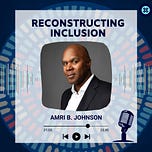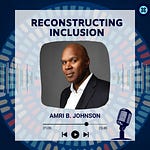In my time hosting the Reconstructing Inclusion Podcast, very few conversations have struck me as deeply as my recent discussion with Ashanti Bentil-Dhue.
As someone who's been in the DEI space for almost three decades, I've seen the field expand and occasionally evolve – not always in the right direction. This conversation was different. It was refreshingly honest, deeply insightful, and perhaps most importantly, focused on the future of our practice.
"The current belief is that knowledge level about different topics, specifically bias, systemic inequality, white supremacy is competency... But of course that's not the case actually at all." [12:00]
The Crisis We're Not Talking About
Let me be frank: we have a competency crisis in DEI. When Ashanti shared that over 90% of DEI providers are self-taught, I wasn't surprised. What shocked me was learning that in the past 12 years, only one research paper has examined professional competencies in our field. For an industry projected to be worth $30 billion in five years, this is more than an oversight – it's a glaring problem.
The Lived Experience Debate
This part of our conversation hit close to home. I've watched as "lived experience" became the gold standard for DEI expertise, sometimes overshadowing actual competency. Ashanti put it perfectly:
"Lived experience is not a competency and there's so many reasons why, which we see in practice when we start looking at outcomes organizations are getting." [15:45]
This resonated with me deeply. I've seen organizations hire practitioners based primarily on their personal narratives, only to struggle to implement systematic change. As Ashanti points out, you can't build organizational strategy on individual experiences alone.
The Neutrality Factor
One of the most provocative aspects of our conversation was about neutrality in DEI practice. Ashanti offered a simple but powerful test:
"If you're saying I, me, my, when you are consulting, advising, training, then you're not leading with neutrality." [14:45]
I've been guilty of this myself in the past. It's easy to fall into the trap of leading with personal narrative rather than professional expertise. But Ashanti's framework challenges us to do better.
A Business Reality Check
Here's something that might ruffle some feathers: DEI in the workplace isn't about social justice – it's about business transformation. I spent years inside firms as an employee or external contributor working to co-create meaningful belief shifts in the organizational mind. That is, design, approaches to making inclusion normative that are accessible to everyone, unambiguously prioritized, and purpose aligned. I couldn't agree more with Ashanti when she said:
"As an employer it's not your responsibility to right the wrongs, one of the world and two of your employees' whole lives... That is not your responsibility." [37:00]
She even tackled the controversial practice of charging premium rates based on personal experiences of discrimination:
"Charging more because you are black and because you've experienced racism in the world at large... All of this is unethical. It continues to undermine the value of our profession." [33:20]
The Storm on the Horizon
We can't ignore the changing landscape. As Ashanti pointed out:
"The U.S. is already seeing laws being passed that impacts the way DEI is currently done... There are push and pull factors whereby the DEI industry is being asked to be accountable and more transparent about the value it actually adds." [24:30]
I've seen this coming. The lack of accountability in our field has made us vulnerable to criticism and backlash. Through her work with the Competence Centre for Workplace Equity, Ashanti has helped identify 13 core competencies for DEI professionals. When I reviewed these competencies, even with my decades of experience, I found areas where I could upskill. That's precisely the kind of humility and professional rigor our field needs.
The Research Gap That Should Worry Us
During our conversation, Ashanti shared something that startled me about her research process:
"We ran a number of surveys... interviewed over a hundred professionals and consultants and asked them about competency specifically, what does it mean to them? How do they create competency in their own practice... And then we also obviously did that secondary data research to see what was already out there... And of course, there was only one white paper, which was about 12 years old." [11:00]
One paper. In twelve years. As someone who's always advocated for evidence-based practice, this revelation hit hard. How can we claim to be transforming organizations when we haven't even studied what makes us effective?
The Health & Safety Parallel
Ashanti drew a comparison that I found particularly illuminating about the future of our field:
"If you look at health and safety, for example, here in the U.K. It was in the seventies that those regulations and laws came in. But now in the workplace or any building... We wouldn't think twice if we saw water on the floor and we didn't notify someone that the floors wet so they can put the cone up... We know now how to protect." [25:30]
This really resonated with me. Just as health and safety evolved from a nice-to-have into a regulated, professional discipline, DEI can't follow a similar path. The stakes are just as high, even if the dangers are less visible.
The Career Pathway Problem
Here's something we rarely discuss: what about the next generation of DEI practitioners? Ashanti raised a crucial point:
"There is a whole crop of new and aspiring professionals, DEI professionals. I get DMs from people leaving university all the time who want to do this work, but there's no established career pathway. You know, if they want to become a doctor or anything else, there are ways of being moderated, regulated, peer-reviewed as they develop in their skills and practice." [26:30]
This hits home for me. How many times have I been asked by young professionals how to get into DEI work? And how often have I struggled to provide a clear answer? In fact, many times, I have steered them away from the idea of “DEI work” and toward building skills and competencies for organizational effectiveness. Such skills are more durable. We're doing a disservice to the next generation by not creating structured pathways for professional development.
Reflecting on this conversation, I'm more convinced than ever that the future of DEI depends on our willingness to move the practice from affective (feeling) to effective. It's time to move beyond personal narratives and toward professional excellence and thriving. After all, isn't that what true inclusion should look like?
Key Takeaways:
We need to establish clear competency standards and embrace regulation
Lived experience alone doesn't qualify someone for DEI practice
Success should be measured through organizational outcomes, not personal impact
The industry must prepare for increased scrutiny
Professional development should be continuous, even for veterans
About the Guest:
Ashanti Bentil-Dhue is not only a visionary business leader but also a renowned expert in diversity and inclusion, currently leading the charge as the CEO of the Competence Centre for Workplace Equity (CCWE). Her journey in the DEI space spans over a decade, marked by an unwavering dedication to using competency-based practices and initiating meaningful change across global workplaces. Innovative approaches characterize her leadership at CCWE using technology like AI and insightful perspectives, which have significantly contributed to enhancing inclusivity and profitability within numerous organizations.














Share this post